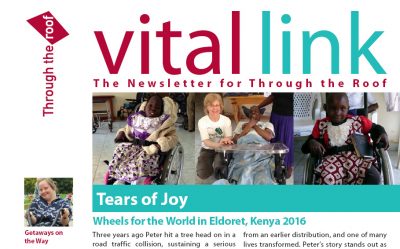Opportunity for Churches: Reaching the Most Unreached People
90% – 95% of the world’s disabled people die without ever hearing the Gospel, according to the Lausanne Committee for World Evangelization. Disabled people are one of the world’s most unreached people groups. Christian disability charity Through the Roof would like to partner with churches to change that and is inviting UK churches to participate in a new survey into churches’ experience of their disabled members.
Training Resources Developer Ros Dakin explains, “We want to hear from churches about all the creative ways in which they are engaging with the disabled members of their communities, and also any questions they have about how they can serve disabled people in the spirit of Luke 14, the Scripture in which Jesus reminds us that without disabled people His house is not full.”
You do not have to be a church minister to take part in this survey; Through the Roof would love to hear from both ministers and church members who can submit answers to the following four questions:
- What one thing do you want to know about disability?
- What is the biggest insight you have received from disabled people and their families about the Christian journey of faith?
- How are disabled people in your church exercising their gifts to build God's kingdom?
- Do you have an example of your provision for disabled people that could encourage other churches?
(please use the following to shape your response...
- Name of activity/project
- Why do you do what you do? (your motivation)
- Whom do you serve?
- What do you do?
- How do you do it?
- Where and when does it happen?
Answers can be submitted by email to our office, by post to Ros Dakin, Through the Roof, PO Box 353, Epsom, KT18 5WS or by telephoning 01372 737042. You can also reply by posting to our Facebook page, or tweet your replies to us, @TTR_uk. The questions can be supplied in large print or braille on request.
In 2014 Through the Roof carried out a survey into disabled people’s experience of church in the UK. The survey revealed some examples of excellent practice in churches around the country, but also some unfulfilled needs. The two biggest findings were a need among disabled Christians for genuine, reciprocal, fulfilling friendships, and a wealth of spiritual experience and gifting which disabled Christians are longing to share with their sisters and brothers in Christ. The full results of the survey, together with an extensive index of resources to help churches address the issues raised by disabled people, have been published under the title All of Us Complete in Christ, and can be downloaded free from our website.
Tears of Joy: Our Spring 2016 Vital Link Newsletter

The spring 2016 Vital Link Newsletter is now available for download - this issue contains stories from our trips to Ghana and Kenya, as well as the family holiday to Dalesdown, and much more. Take a look! Please note that an order form for TTR's resources and other products is included at the end of this PDF download
- The Spring 2016 Vital Link (and Order Form) - right-click and save the file
Please get in touch (on 01372 749955 or by following this link to email us) if you have any problems downloading this, or if you’d like to receive future newsletters by post or email.
Opportunity for Churches: Reaching the Most Unreached People
90% – 95% of the world’s disabled people die without ever hearing the Gospel, according to the Lausanne Committee for World Evangelization. Disabled people are one of the world’s most unreached people groups. Christian disability charity Through the Roof would like to partner with churches to change that and is inviting UK churches to participate in a new survey into churches’ experience of their disabled members.
Training Resources Developer Ros Dakin explains, “We want to hear from churches about all the creative ways in which they are engaging with the disabled members of their communities, and also any questions they have about how they can serve disabled people in the spirit of Luke 14, the Scripture in which Jesus reminds us that without disabled people His house is not full.”
You do not have to be a church minister to take part in this survey; Through the Roof would love to hear from both ministers and church members who can submit answers to the following four questions:
- What one thing do you want to know about disability?
- What is the biggest insight you have received from disabled people and their families about the Christian journey of faith?
- How are disabled people in your church exercising their gifts to build God's kingdom?
- Do you have an example of your provision for disabled people that could encourage other churches?
(please use the following to shape your response...
- Name of activity/project
- Why do you do what you do? (your motivation)
- Whom do you serve?
- What do you do?
- How do you do it?
- Where and when does it happen?
Answers can be submitted by email to us, by post to Ros Dakin, Through the Roof, PO Box 353, Epsom, KT18 5WS or by telephoning 01372 737042. You can also reply by posting to our Facebook page, or tweet your replies to us, @TTR_uk. The questions can be supplied in large print or braille on request.
In 2014 Through the Roof carried out a survey into disabled people’s experience of church in the UK. The survey revealed some examples of excellent practice in churches around the country, but also some unfulfilled needs. The two biggest findings were a need among disabled Christians for genuine, reciprocal, fulfilling friendships, and a wealth of spiritual experience and gifting which disabled Christians are longing to share with their sisters and brothers in Christ. The full results of the survey, together with an extensive index of resources to help churches address the issues raised by disabled people, have been published under the title All of Us Complete in Christ, and can be downloaded free from our website.
Briefing on the EU Referendum from a Disability Standpoint (Ros' Blog)

It is a little over a month to the EU referendum, and I suspect I’m not alone in thinking that the standard of content of the debate has been dismally low. There have been ever more extravagant predictions of disaster from both sides. I almost expected the Prime Minister to end his speech the other day, like Private Fraser from Dad’s Army, with a macabre “We’re all dooooooomed”! At the same time, the Leave campaign has portrayed a Britain that remains in the EU as an eviscerated state with no sovereignty, overrun by European migrants, conveniently forgetting that Britons in the EU claim more in benefits than do citizens of other EU countries in Britain.
So how do we find any accurate information, or at least informed opinion? And in particular, how do we know what will be the likely effects on disabled people of leaving or remaining in the EU? And finally, how as Christians should we be praying for the outcome of the referendum?
I have spent some time researching online how disabled people are likely to feel the impact of the result, whichever way it goes. And, as with most aspects of this debate, there is little out there other than biased and largely uninformed speculation. However, among all this some people are making a few good points, although of course none of us can truly predict with any accuracy what the effects will be for the disabled citizens of our nation; only time will really tell.
Through the Roof is a strictly non-political organisation. We have no interest in supporting any particular political party, nor in taking sides in the referendum debate. But we can play a useful role in setting out the salient issues on both sides of the argument which will affect our supporters. To that end, here are some of the better thought out arguments I have come across.
In favour of remaining in the EU
I have found the following facts which are relevant to disabled peoples’ interests, and which would favour remaining in the EU:
- Treatments have been developed through European research for diseases so rare that no one country could have done it alone, highlighting the benefits of being a part of the EU1
- In 2015, 87,000 British disabled people were helped towards employment through training paid for by European Social Funding2
- The EU has implemented measures against forced institutionalisation of disabled people3
- There have been many occasions when European legislation has been ahead of the UK’s or what the UK was prepared to deliver on disability rights4
- British people can currently visit any country within the EU and be guaranteed the same health services at the same cost as a local resident, thanks to the European Health Insurance Card5
And I have found the following reasonably well informed opinions which favour remaining in the EU from a disability standpoint:
- Leaving the EU could undermine the rights of the 10 million people in Britain who are currently living with a disability, since our disability laws are to a large extent based on EU legislation6
- If the economy took a nosedive there could be more austerity cuts7
- Any withdrawal from the European Convention on Human Rights could have a negative impact – successful challenges to the 'bedroom tax' have been based on this8
- Restrictions on the currently unrestricted inward EU migration might mean a time of higher employment in the UK. During times of low employment social care providers can recruit better quality staff but this becomes harder when we are closer to full employment9
- The European Convention on Human Rights proceeded not from the EU but from the Council of Europe, of which we would remain a member even if we were no longer part of the EU. In fact, there are currently 29 European countries which are members of the Council of Europe but not of the EU. So we could still have full participation in Europe and be covered by the ECHR10
- This means that for the time being people could still appeal to the European Court of Human Rights, unless or until a UK government decided to withdraw from it11
- The UK Human Rights Act and Equality Act would be unaffected by leaving the EU unless a UK government decided to introduce new legislation12
- Political Union with Turkey would result in an additional 77 million mainly poorer people having access to EU rights and benefits, putting additional strain on an already stretched benefits system13
- The EU Clinical Trials Directive has caused significant harm, including severe disruption of new drugs trials, which could resume, untrammelled by these regulations14
- The EU is too big and too corrupt to care about helping people out of austerity measures15
- Iain Duncan Smith has said he believes the EU favours the “haves” rather than the “have nots” and that the least advantaged members of society would prosper more outside the EU16
- John Redwood MP claims Brexit would transform spending on the NHS and disability benefits by replacing austerity with prosperity17
- A vote to stay in is not a vote for the status quo. There are undoubtedly new measures waiting to be enacted which will not be revealed until after the referendum for fear of influencing people’s votes. The Five Presidents’ Report18 indicates plans for increased harmonisation between EU states, including on Social Security, and no one knows whether these would strengthen or weaken the rights of the disabled poor19
- http://europa.eu/rapid/press-release_MEMO-14-141_en.htm
- http://www.richardhowittmep.com/index.php/all-news/825-11-03-2016-ten-million-disabled-people-will-lose-if-britain-leaves-the-eu-says-richard-howitt-mep
- http://eur-lex.europa.eu/legal-content/EN/TXT/?uri=CELEX%3A52005DC0604
- Lord Low, quoted in http://www.disabilitynewsservice.com/brexit-would-have-dire-consequences-for-disabled-people/
- http://www.nhs.uk/NHSEngland/Healthcareabroad/EHIC/Pages/about-the-ehic.aspx
- http://www.theguardian.com/social-care-network/2016/mar/11/brexit-could-undermine-the-rights-of-disabled-people
- Deborah King of Disability Politics UK, quoted in http://www.disabilitynewsservice.com/brexit-would-have-dire-consequences-for-disabled-people/
- http://govanlc.blogspot.co.uk/2013/10/european-convention-of-human-rights.html
- https://www.dimensions-uk.org/news-blog-post/disabled-brexit-might-mean/
- http://www.bbc.co.uk/news/uk-politics-32810887
- http://www.telegraph.co.uk/news/newstopics/eureferendum/12175398/EU-Referendum-everything-you-need-to-know-about-British-sovereignty.html
- https://www.equalityhumanrights.com/en/impact-eu-membership-equality-and-human-rights
- http://www.debatingeurope.eu/focus/infobox-arguments-for-and-against-turkeys-eu-membership/#.VzMp2Pbmrcs
- http://www.talkcarswell.com/home/how-eu-membership-killed-off-uk-clinical-trials/2837
- http://globalcomment.com/what-a-possible-brexit-could-mean-for-britains-disabled-people/
- http://www.bbc.co.uk/news/uk-politics-eu-referendum-36252295
- http://www.bbc.co.uk/news/uk-politics-eu-referendum-35873996
- https://ec.europa.eu/priorities/publications/five-presidents-report-completing-europes-economic-and-monetary-union_en
- https://hansard.digiminster.com/commons/2016-05-09/debates/1605098000001/EUReferendumLeaflet
- https://www.churchofengland.org/media-centre/news/2016/04/prayer-for-the-eu-referendum-campaign.aspx
- Luke 19.42
- Luke 12.7
- Matthew 25.31-46
- Matthew 6.10
- 1 Timothy 2. 1-4
- Isaiah 9.7
In Favour of Leaving the EU
I have found the following facts which would favour leaving the EU:
And I have found the following reasonably well informed opinions which favour leaving the EU from a disability standpoint:
How should we pray?
So there you have it. A variety of facts and opinions from both sides of the debate, which we hope will help you to make up your mind. But thankfully, as Christians, we are not reliant on our own ability to work out what we think is best. We have a source of wisdom in the person of the Holy Spirit indwelling us, and we can trust Him to guide us as we make our decision prayerfully. What should we pray for? The Church of England has published a prayer to help us focus our intercession on the things which should matter most to us20, and this is a good place to start.
The debate among politicians and in the media has mainly been focused around the issues of economic prosperity and national sovereignty. But for Christians, as important as these things are, they cannot be the main issues that motivate us. Our concerns must be, as God’s concerns are, what makes for peace21, for individual human flourishing22, for social justice23, for God’s kingdom to come and His will to be done24, and for conditions to prevail in which the Gospel can spread25 and in which we will begin to see the coming of that Kingdom and that King of the increase of whose government and of peace there shall be no end26.


